Our aim is to help develop the protective factors which build resilience to mental health problems and to be a school where:
Mental Health and Wellbeing
At Grove Primary School, we know that our role is to ensure that pupils are able to manage times of change and stress and that they are supported to reach their potential or access help when they need it. We also have a role to ensure that pupils learn about what they can do to maintain positive mental health, what affects their mental health, how they can help reduce the stigma surrounding mental health issues, and where they can go if they need help and support.
Mental Health Award
We are delighted to announce that Grove Primary School has been awarded the Carnegie Centre of Excellence for Mental Health in Schools ‘School Mental Health Award’ – Silver Status. Working towards the School Mental Health Award has helped Grove Primary School to focus on the whole school community and its stakeholders, ensuring that there is a coordinated approach to mental health and wellbeing at the school. We are very proud!
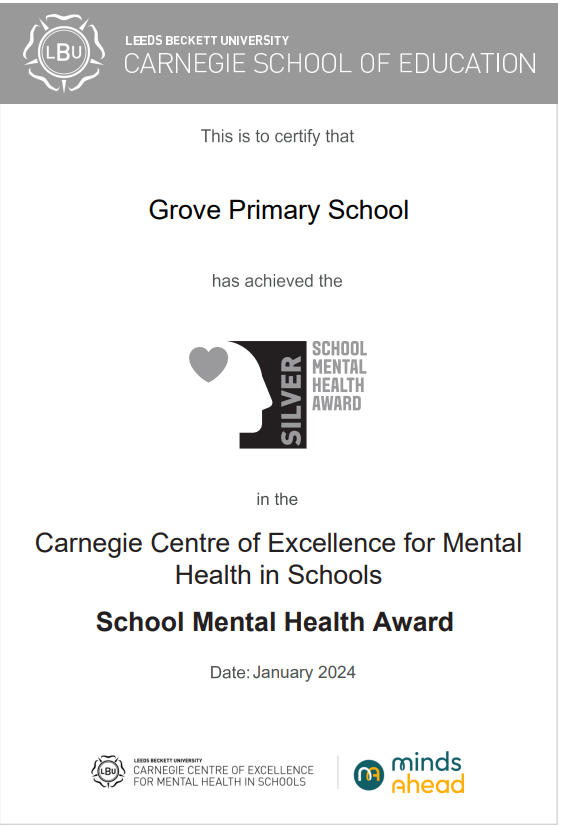
A profile of written statements with evidence demonstrates that we are ‘Embracing’ across all eight competencies of the School Mental Health Award. The framework and content of the Award helped develop our mental health and wellbeing strategies, structures, and practices We review and update existing policies and practices to prioritise staff wellbeing and mental health, these include clear guidelines for implementation. ‘Grove is a happy place to attend and work. It is child centred organisation with a strong inclusive culture’.
What is Mental Health and Wellbeing?
To avoid ambiguity or confusion, as a school community we use the World Health Organisation’s definition of mental health and wellbeing “a state of wellbeing in which every individual realises his or her own potential, can cope with the normal stresses of life, can work productively and fruitfully, and is able to make a contribution to her or his community”.
Whole School Approach
We take a whole-school approach to promoting positive mental health and ensuring the pupils are positive, resilient and able to deal with the stresses of the school day. We recognize the stigma behind talking about mental health and aim to create a school environment which is open and supportive with a positive culture where pupils feel comfortable discussing a range of issues.
Mental Health and Wellbeing is not just the absence of Mental Health problems.
We want all pupils to:
- Feel confident in themselves and realise their own abilities
- Cope with the stresses of everyday life
- Work productively and be able to learn and achieve
- Be able to express a range of emotions appropriately
- Be able to make and maintain positive relationships with others and make a contribution to their community
- Manage times of stress and be able to deal with change
Our Wellbeing Aims
All Pupils are valued
- Pupils have a sense of belonging and feel safe
- Pupils feel able to talk openly with trusted adults about their problems without any stigma
- Help pupils to form and maintain relationships
- Positive mental health is promoted and valued, this includes promoting self-esteem, encouraging pupils to be confident and helping pupils develop emotional resilience through managing setbacks
- Enable and support early identification of vulnerable pupils and early intervention of need.
- Bullying is not tolerated.
We promote a Mentally Healthy Environment Through:
- Access to a range of appropriate support that meets their needs.
- Providing opportunities to reflect both internally and where necessary with an external agency.
- Providing opportunities to develop a sense of worth through taking responsibility for themselves and others.
- Celebrating academic and non-academic achievements.
- Promoting pupil voice and opportunities to participate in decision-making within the class and across the school through pupil leadership groups such as school council, anti-bullying ambassadors, eco-warriors and junior citizens.
We Persue Our Aims Through
ELSA Support
Relationships are key in helping children and young people to feel safe and nurtured. ELSA is about creating a reflective space for the child or young person.Please see our leaflet on ELSA
What areas does an ELSA help with?
- Loss and bereavement
- Emotional Literacy
- Self-esteem
- Social Skills
- Friendship issues
- Relationships
- Managing strong feelings
- Anxiety and worries
- Bullying
- Conflict
- Emotional Regulation
- Growth Mindset
- Social and therapeutic stories
- Problem-solving
How are children or young people referred for ELSA?
- Class teacher referral
- Sendco referral
- Parent Referral
- Child referral
- Outside agency referral
We are a TELLING school.
This means that anyone who knows or suspects that bullying is taking place is encouraged to tell a member of staff and we promise it WILL be investigated.
We employ a range of activities and initiatives to tackle bullying including:
- TELLING school ethos
- Anti-bullying ambassadors
- Stonewall School Champions
- Assemblies
- Anti Bullying Week
- Internet Awareness Week
- Positive achievement assemblies
- PHSEE sessions on E-safety and bullying
- Parental/staff/student surveys
Tootoot
Resolving pupil concerns quickly:
Tootoot makes it simple for our students to report anything from bullying to a mental health concern. The simple-to-use app makes it easier for children to speak up and gives them confidence that their concerns are being taken seriously.
Whole School Approach
- Creating an ethos, policies and behaviours that support and promote positive mental health and resilience, and which everyone understands.
- Helping pupils to develop social relationships, support each other and feel able to seek help when they need it.
- Helping pupils to be resilient learners who are able to manage the stresses of everyday life.
- Teaching pupils social and emotional skills and an awareness of mental health destigmatise mental health.
- Early identification of pupils who have mental health needs and planning support to meet their needs, including working with specialist services and tailored individual plans.
- Effectively working with parents and carers.
- Supporting and training staff to develop their skills and their own resilience.
Mental Health and Wellbeing survey
We conducted a survey recently to help us gain an understanding about the wellbeing and mental health needs of the pupils at Grove Primary School. Below is a summary of the responses:
88% - I can tell you lots of good things about myself
89% - I am good at making and keeping friends
54% - I sometimes worry about the future
90% - I feel safe when I am at school
84% - Most children are kind at school
93% - My teachers and staff make me feel safe
90% - There is someone at school that cares about me
95% - I know who to speak to if I am worried about something
91% - Most of the time I enjoy coming to school
The outcomes of this survey have led to the following actions:
- During anti-bullying week children have engaged in a variety of activities focusing on what it means to be a good friend and what to do if they are feeling worried or upset.
- We have 14 anti-bullying ambassadors who have been introduced to all the children. These help create a safer, kinder school community through peer support
- Children have been reminded about the different pathways to raise concerns (Toottoot, worry box, speaking with a trusted adult).
- School Councillors hold regular drop-ins for children to share ideas about how to improve provision.
- Mid-day supervisors have timetabled activities which are run at lunchtime
Useful websites for families
Redbridge provides a wide range of free treatments and services for anyone going through a hard time, or struggling with feeling stressed, anxious, low or other distressing emotions. Services are confidential, easy to access and available to people living in the London borough of Redbridge.

https://www.talkingtherapies.nelft.nhs.uk/redbridge/
Young Minds has lots of practical advice and tips on supporting your child – from how to encourage your child to open up about their feelings to dealing with mental health services.
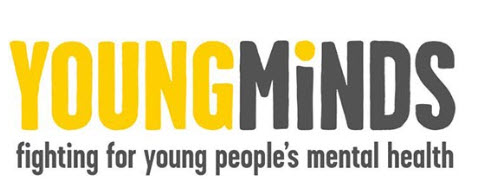
https://www.youngminds.org.uk/parent/
Anna Freud National Centre for Children and Families is committed to discovering and sharing the best way to help children, young people, families, carers and professionals affected by mental health problems.
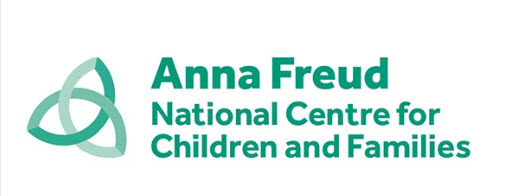
https://www.annafreud.org/resources/family-wellbeing/
Childnet’s website contains tips on what you need to know as a parent, the latest risks and how to seek help if you know someone at risk.

https://www.nhs.uk/mental-health/children-and-young-adults/advice-for-parents/
The Internet Matters website provides lots of useful articles on online safety, as well as a detailed look at the issues that can affect children.
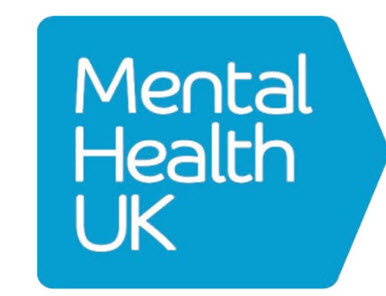
https://mentalhealth-uk.org/help-and-information/advice-for-parents-and-guardians/

The parent section of this website contains tips, advice, guides and resources to help keep your child safe online.
https://www.bbc.co.uk/bitesize/groups/cw9v6l8d0q6t
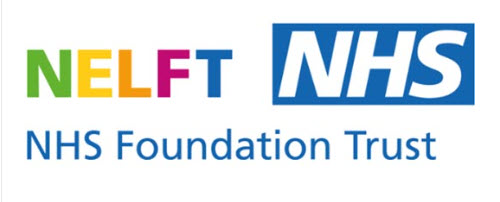
Service offering help to children and young people who are experiencing emotional, behavioural or mental health difficulties
https://www.nelft.nhs.uk/redbridge-camhs/

